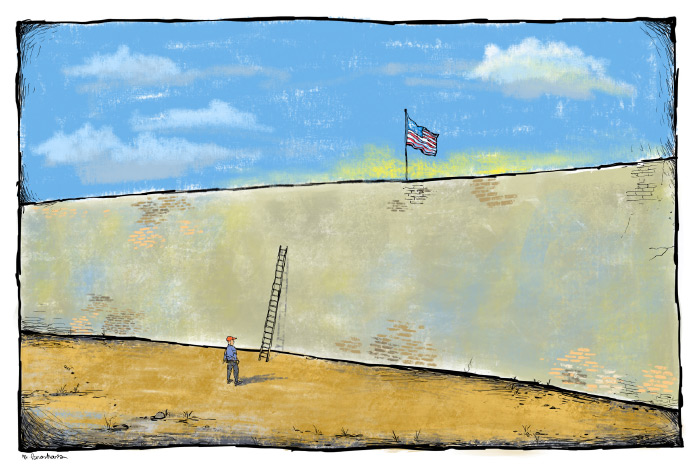It's Begun: The Rules of Who Gets Deported Changed Two Weeks Ago

On February 20, 2007, just before dawn, armed federal agents from Immigration and Customs Enforcement (ICE) raided a home in East Hampton just down the street from where I live. They had guns and were looking for a particular Latino man who was wanted for deportation and was suspected to be in that house.
He wasn’t there. Awakened in the house when the ICE people came in were about a dozen terrified people of Latino descent, including women and children, all of whom were legal residents awaiting naturalization. Even though the man wasn’t there, the agents rousted the occupants out of their beds in their nightclothes and, with many children screaming, spent a considerable time interrogating everyone. In the end, the agents left, reportedly telling the residents that they would return.
This raid took place because President George W. Bush a few months earlier had quietly ordered an increased effort to round up people nationwide who were here illegally. As a result of bad publicity and the subsequent lawsuits from citizens, he called off this effort shortly thereafter.
As for the victims in the case brought by the Aguilar and Leon families against ICE in East Hampton, a court years later awarded them a million-dollar settlement.
It is also true that in that year, President Bush decided to build a wall separating America from Mexico, using more sophisticated security techniques. Boeing was engaged to work on the first part of it along the Mexico-Arizona border. But after spending $1 billion of taxpayer’s money, and discovering Boeing had only succeeded in putting up 400 unattended ground sensors, 15 sensor towers and 13 communications towers along just 52 of the fence’s 1,000 planned miles, the effort was called off.
As you know, things are changing. Last week on DansPapers.com, Brian Cudzilo interviewed local immigration lawyer Christopher Worth and wrote a remarkable account about the change in the immigration procedures that took place six days after Donald Trump became president.
Largely because of what happened in East Hampton and other places, and because the Constitution’s Fourth Amendment protects the citizenry from unfounded search and seizures, new ICE rules about raids on homeowners were put into place at that time. Those rules would not allow a search, seizure or arrest unless the person they were hoping to arrest was a national security threat, a gang member, was undocumented, had been convicted of a felony, three misdemeanors or one DWI, and had continuously been living in America for less than two years.
On January 26, 2017, things changed, in spite of the fact that Trump had, toward the end of his presidential campaign, pledged not to engage in deportation if it broke up law-abiding families. He would make a decision about those people on another day.
That’s not what he is doing. The new, current order he put into effect on that day says people can be deported not only if they have been convicted of a felony, but also if they had only been charged with a felony, regardless of whether the case had been resolved or not. ICE can also deport people who have “abused public benefits,” whatever that means, or, in the opinion of the ICE agent, “pose a risk to public safety and national security.”
Can they break down your door and raid you in the middle of the night without a warrant? Well, after 2006, a rule was put in that said if ICE officials show up at someone’s house in the belief they are dealing with illegals, they must ring the bell or knock. If whoever answers opens the door, that is the equivalent of giving permission to enter, and so the ICE agents, even without a judge’s warrant, can then do so.
That ICE rule remains unchanged to this day.
What about the Statue of Liberty? “Give us your tired, your poor, your huddled masses… etc.?”
Well, that concept was in effect from the founding of the country until 1917. During those years everyone was welcome here, and until that date they could just pay passage on a boat to get here and they would typically not be turned away unless they were deemed mentally ill or seriously ill with an infectious or life-threatening disease. There was a de-lousing procedure on Ellis Island. Thus came our grandparents, and great grandparents, including mine. Legally.
In 1917, America was about to join the French and English in fighting World War I against Germany. Our arrival would turn the tide. It also would result in the death of over 50,000 American soldiers.
In the years just before 1917, the U.S. Congress repeatedly tried but failed to pass laws limiting the immigration of people from Europe where this great war was going on.
There was also the matter of eugenics. This was at a time when science was making great strides. The telephone was invented, the moving picture, the electric light, the automobile, the airplane, the skyscraper. Soon, some crackpot scientists were claiming they had scientifically determined that certain people were genetically superior to others. If you could stop those of the lower order of people from procreating and enhance the higher order people’s ability to do so, you could breed a super race.
This “discovery” was a big deal, even here in America. In the heartland of America, there were laboratories where the feebleminded or lower order people were castrated or worse. I know this sounds horrible. It was.
Madison Grant, the Chairman of the New York Zoological Society, and an American, wrote a book about science and eugenics in 1916. “To admit the unchangeable differentiation of race in its modern scientific meaning is to admit inevitably the existence of superiority in one race and of inferiority in another…. The Anglo-Saxon branch of the Nordic race is again showing itself to be that upon which the nation must chiefly depend for leadership, for courage, for loyalty, for unity and harmony of action.”
Thus there were congressmen who wanted to stop the arrival of those who might dilute our basic, superior English background. The Germans had come and the Irish had come in the late 1800s. The Jews and the Italians had come in the early 1900s. (I’m Jewish.) Practically all these interlopers were from Eastern or Southern Europe. They were not English.
Congress voted new rules for immigration. President Wilson vetoed the bill. Congress overrode it.
All applicants to America after 1917 had to pass a literacy test in English, and pay a $5 entry fee. In some amendments passed a few years later, it was also ruled that only 2% of a total number of people already in America with a particular nationality would be allowed in. And the benchmark for that would be the nationality mix in 1890. That largely stopped a huge influx of Italians, who came in by the millions between 1910 and 1920. There was also a “gentleman’s agreement,” still in force, that would make entry into America from Asia extremely difficult.
During World War II, using the quota arrangements then in force, President Roosevelt, to appease the “America Firsters,” turned away a boatload of Jews who had escaped Nazi Germany. The ship the USS St. Louis had to turn back and return to where it came from.
Over the years, the law got modified further. Eventually, this “quota” requirement got changed in 1965 as the Hart-Cellar Act enacted by the 89th Congress and it is in effect today.
Hart-Cellar keeps limits on how many people can come in from any particular country, and it is more concerned with applicants’ skills and relationships with family members who are already citizens here. The law also changed to end the ban on applicants from Japan.
I think there are three things that should be learned from this survey about immigration laws.
The first is that these laws were proposed by Congress, not by a president issuing decrees. In these earlier cases, a president vetoed these proposals and sent them back for revision before finally approving them. In one case, Congress overrode the veto of a sitting president. Only in dictatorships does a president get to order the laws, put them into effect and declare judges who knock them down “so-called,” as this one did when a sitting judge in California did not agree with what he did. In America, we have the judicial, legislative and executive branches of government. The president has only limited ability to order executive edicts. That’s all in the Constitution.
The second thing is that the United States was considered the Promised Land for everyone, but only fully so until 1917, when these restrictions began to be put into place.
It’s also true that Australia became populous with westerners when the English sent their Irish prisoners to that country, without their consent, to serve out their prison sentences there. After that, the Australians have taken in a great number of people. Consider the recent phone call to Trump from the Australian prime minister wanting reassurance that America would accept 15,000 refugees fleeing persecution who’d been accepted to Australia with the understanding—from Obama—that they would be moved on to the United States.
Thirdly, consider that the bulk of this story is about legal immigration. In the revision in 1965, it was declared that a maximum of 170,000 visas would be accepted annually (Trump has reduced it to just 50,000 for 2017).
But this essay is largely about legally admitted immigrants, and not about people from south of the border who took their chances by coming here to find a better life by walking across an unguarded border.
Today, this flood of illegal immigration, estimated at over 10 million, has subsided and there are more Latinos returning to cross the border back to Central and South America than are coming in. Indeed, from 2009 to 2015, President Obama had 2.5 million people deported, almost all of whom were problem people from south of the border. No President has deported more people than Barack Obama.
I don’t think anyone objects to problem people without documents being rounded up and returned to their homelands.
But those who have been here for five years or more and have stayed out of trouble are another story. Many have started families and are raising children here. After all this time, they should not be sent back, they should be treasured and celebrated, not for what they did years ago, but for what they have accomplished in a law abiding way since. And at the same time that we create a situation where no more can come across a border illegally, there should be a path to citizenship for these people.
That is my view.
* * *
What is attorney Christopher Worth’s advice to the undocumented already here? Be polite. Don’t carry documents from your homeland. Don’t carry false papers. Right now, before you are picked up, call a lawyer or a reputable nonprofit that defends people who are picked up. Have the name and number of that person handy. If approached by ICE or the police, do not try to leave the scene. If you find yourself started on the deportation routine, you may have little opportunity to find a lawyer to defend you. And most important, stay out of trouble. If you have done that, trust that the basic goodness of American life will see you through.
* * *
Last week, our congressman, Lee Zeldin, sent out a survey to his constituents asking for their opinions about how he should do his job. One question he asked was remarkable:
“Do you believe a Congress should be a check and balance on President Trump or help President Trump pass his agenda?”
Here’s our legislator asking our permission to legislate—or to just support the edicts from on high.



